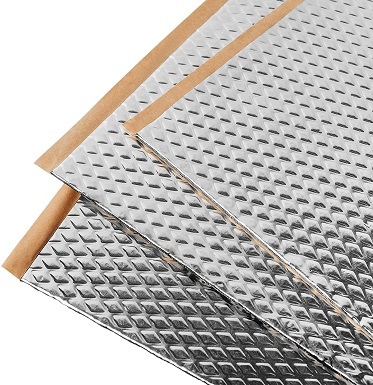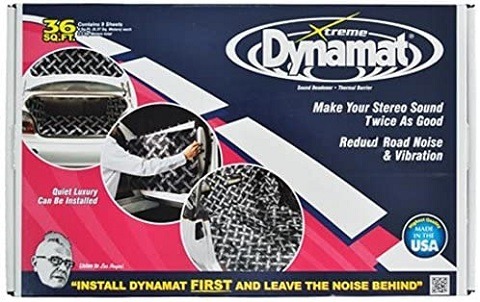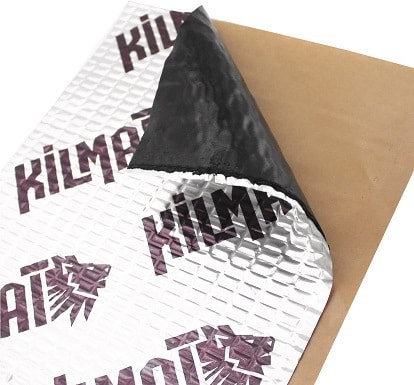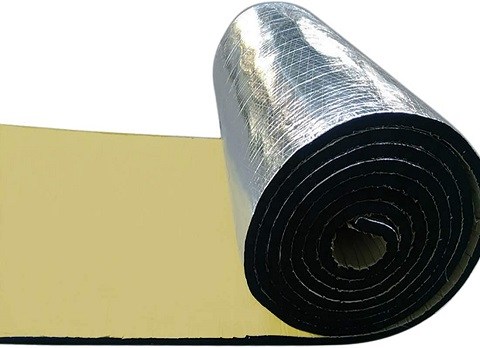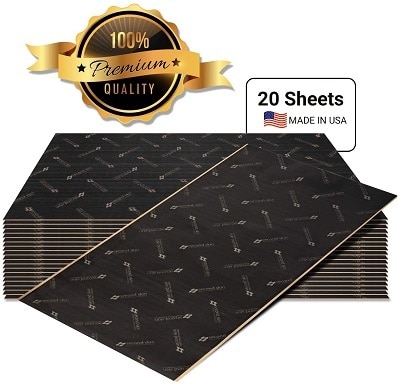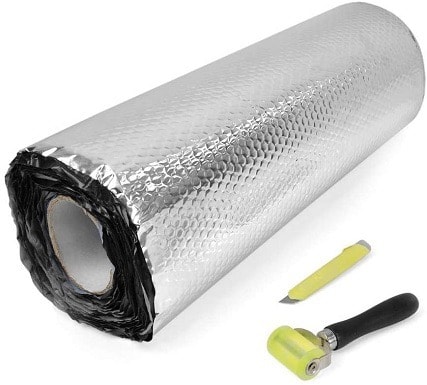10 Best Sound-Deadening Materials for Cars in 2025 – Reviews & Top Picks
-

- Last updated:
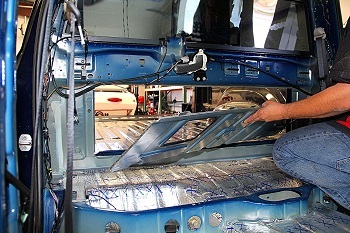

These days, more people are aware of the consequences of excessive noise and are taking steps to cut it out of their lives. Since you get exposed to a lot of harmful noise while driving, fitting your car with sound-deadening material is an excellent first step to achieving a quieter life. It also makes your drive feel more luxurious and lets you hear your sound system better.
Several sound-deadening materials are available, along with strong opinions about which ones are the best. We put together this list of reviews to help you tell your FatMats from your Dynamats and figure out exactly which sound-deadening materials you need in your car.

A Quick Comparison of Our Favorites
| Rating | Image | Product | Details | |
|---|---|---|---|---|
Best Overall

|

|
FatMat RT50 Rattletrap Sound Deadener |
|
CHECK PRICE |
Best Value

|

|
Noico SNL1 Car Sound Deadening Mat |
|
CHECK PRICE |
Premium Choice

|

|
Dynamat 10455 Self-Adhesive Sound Deadener |
|
CHECK PRICE |
|
|

|
Kilmat KLM5050 Car Sound Deadening Mat |
|
CHECK PRICE |
|
|

|
Thermo-Tec 14620 Heat and Sound Suppressor |
|
CHECK PRICE |
The 10 Best Sound-Deadening Materials for Cars – Reviews 2025
1. FatMat RT50 Rattletrap Sound Deadener – Best Overall
FatMat RT50 came out on top of our list of sound-deadening materials because of how effectively it combines an affordable price with great results. It takes a little more work to apply than some others, but we can’t argue with its power to dampen sound.
One roll is almost enough to cover an entire sedan or the floor of a larger truck. Once you begin installing it, FatMat RT50 conforms to the shape of your car’s floor, doors, or ceiling, leaving no crevices for sound to get through. It’s thick but still flexible. While layering makes it even more effective, it’s not necessary by any means.
Other than the marginally more complex installation, the only downside of FatMat RT50 is that the aluminum coating is sharper than it looks. Be careful, or you might get cut.
- Thick yet flexible material
- One roll goes a long way
- Adheres to the shape of car
- Cuts way down on noise
- Sharp aluminum edges
- Takes some work to install
2. Noico SNL1 Car Sound Deadening Mat – Best Value
If your budget is too tight for FatMat, we enthusiastically recommend Noico SNL1, which is the best sound-deadening material for cars for the money. Getting a square foot of sound-deadening insulation for this cheap honestly made us a bit suspicious, but when we tested Noico, we were relieved to find out that it cuts out sound just like the competition.
It’s a breeze to cut, and while it takes a bit of time to install—we’d advise allowing two hours per door—even 25% coverage makes a noticeable difference. Its dense butyl construction cuts vibrations down to almost nothing, leading to a wonderfully quiet drive.
The only downsides to using Noico SNL1 are that it’s not as thick as FatMat and doesn’t cancel out vibrations quite as effectively. You might also notice a faint asphalt-like smell just after installing it.
- Extremely affordable
- Deadens vibrations and cuts out road noise
- 100% coverage is unnecessary
- Less thick than leading brands
- Unpleasant smell
- Can cut your skin
3. Dynamat 10455 Self-Adhesive Sound Deadener – Premium Choice
If you’ve researched sound-canceling materials for your car, you’ve almost certainly heard of Dynamat, the brand all the others define themselves against. Despite Dynamat truly living up to the hype, we were reluctant to put them at the top since they don’t sell their sound-dampening mats in sets of less than 9.
While this makes their product expensive and inconvenient, Dynamat 10455 is still a superior choice for drivers not up for measuring and cutting their own material to shape. Each 18 x 32-inch mat will dampen vibrations and silence driving noise wherever you set it down. The drawback of Dynamat 10455 mats, besides the premium price and the fact that you must buy them in bulk, is that they’re best at deadening standard sounds. Both available thicknesses will struggle to reduce louder-than-average road noise, such as the rattle from chains or snow tires.
- Very simple installation
- Don’t have to cut your own mats
- Effective sound deadening
- Cannot shape mats to your specific needs
- Expensive
- Not good at dampening loud or unusual noises
4. Kilmat KLM5050 Car Sound Deadening Mat
Kilmat is another strong option for stretching your money on sound-deadening material; the company claims you can cover your entire car for the cost of insulating the doors with Dynamat or FatMat, and in many cases (depending on the car), they’re right.
Kilmat’s butyl insulation is easy to cut with scissors and thin enough to adhere to uneven surfaces on your car’s doors, floor, and trunk. It also has no sharp cutting edges or nasty smells, which more expensive brands still struggle with. So why is it only at #4? Simply put, it’s not as good at dampening sound. We mentioned it’s very thin: thickness is always a balancing act, and Kilmat KLM5050 might be too thin to dampen noise in some cars.
- No bad smell
- No sharp edges
- Easy to cut
- Cheap
- Very thin
- Less effective at dampening noise
5. Thermo-Tec 14620 Heat and Sound Suppressor
This 36 x 60-inch roll of insulation material is designed to protect surfaces against vibration and heat. It’s not explicitly built for cars, but it works perfectly well to quiet rattling in cars and doors, with the bonus of keeping the interior cool in the summer.
Thermo-Tec is as simple to install as a bumper sticker: just peel off the back and stick it down wherever you need it. It cuts easily, and its adhesive is impressively tight at room temperature. It’s ideal for any space where you spend a long time near a loud engine, like an RV, long-haul truck, or motorboat. We found that Thermo-Tec works as advertised to keep those spaces cooler and quieter. It also makes good cushioning for floorboards.
Beware: we only said the adhesive is strong at room temperature. It can handle ambient heat fine, but if you install this too close to an engine or any other extreme heat source, the glue will run and drip. There’s also a tangible asphalt smell.
- Combination noise and heat shield
- Easy to apply
- Sticks well at normal temperatures
- Adhesive melts in high heat
- Asphalt smell
6. Uxcell 394mil Car Noise Sound Deadener
Uxcell’s 60 x 40-inch sheet of dampening material is cheap, all-purpose fiberglass insulation. Do you need to wrap a pipe, keep the heat in an attic, or reduce engine noise so you can hear your sound system? Uxcell has you covered.
Fiberglass is great for temperature control, but Uxcell only cut out quieter noises in our sound tests. Its foam construction does wonders to hold in heat, but when it comes to dampening sound, it’s just not heavy enough. The foam also takes up enough space that it’s hard to layer.
If you want an economical solution for sound deadening, you could still do much worse. Uxcell deadening material is easy to cut with scissors, and the adhesive stays strong even when close to the engine.
- Adhesive works when hot
- Easy to cut
- General-purpose fiberglass can be used in places other than your car
- Does not cut out noise effectively
- Foam is too thick to layer
7. Stinger RKX36B Roadkill Expert Sound Damping Material
Stinger’s bulk pack of Roadkill sound-deadening material aims to be a complete solution for a single car. We’re skeptical of one-size-fits-all claims as a rule, but after trying it out, we must admit that the Stinger Roadkill bulk pack is a lot of high-quality material for an excellent price per square inch.
What do we mean by “high quality”? First, it’s not asphalt-based, meaning no tar smells in your car. Second, it reduces vibrations significantly at just 25 percent coverage, provided it’s applied correctly.
That last part is the catch. Roadkill has good value, but it’s only effective if you apply it to the inner shell of your car doors, which is much more work. It’s also only for deadening noise, not canceling it, which means noises in the middle of the frequency spectrum, like wind and tire sounds, will not be affected.
- Low price
- No asphalt smell
- Effective at low coverage percentages
- Only works on high and low-frequency noises
- Labor-intensive to apply
8. Second Skin Audio Damplifier Sound Deadening Mat
Second Skin Audio’s “Damplifier” sound deadeners are intended to cut down on structural noises so you can hear your sound system more clearly. The butyl construction of these mats avoids noxious asphalt smells, granting them a high enough heat capacity to serve as heat shields and noise dampeners.
Cutting down vibrations and improving sound system quality go a long way toward Second Skin’s goal of making any car feel like a luxury car. However, these sound dampeners still fall short of that mark in a few ways. While there’s no asphalt smell, there is an unpleasant tang of zinc, though that goes away after the first few days. The mats are very thin, which makes them unable to impact noise very much, but they also have aluminum backing, which makes them hard to cut and dangerous to install.
- Reduces vibrations
- Easier to hear sound system
- Also good heat shields
- Sharp metallic smell right when installed
- Dangerous aluminum backing
- Too thin to make much difference
9. HushMat 10200 Ultra Black Foil Door Kit
Just because the HushMat 10200 is at #9 on our list doesn’t mean this sound-dampening kit is a faulty product. On the contrary, these mats keep your doors from rattling and can increase the bass power of a low-frequency sound system. They’re also very flexible and easy to apply with a roller.
HushMat is in ninth place because we need to consider every possible use of a sound deadener. These mats work well with sound systems, but not everyone is an audiophile, and in our tests, they didn’t make a dent in road and engine noise. If you have a rattling problem, HushMat is for you, but for more complete soundproofing, look somewhere else.
- Increase bass volume
- Easy to apply
- Not effective at reducing road noise
10. Pyle PNVBD3621 Audio Sound Deadening Material
Pyle’s sound-deadening material does what it’s supposed to. If you install it in the right parts of your car, you will enjoy better clarity out of your sound system. While it’s in place, you might notice a significant reduction in unwanted noise. By that strict definition, it’s a good product.
But that’s not the only metric we looked at, and outside of the core mission, Pyle premium insulation is a sloppy product. Its aluminum edges are razor-sharp, and they’re sharper than the other brands we criticized. Its adhesive is weak and dissolves entirely in a matter of months. Lastly, the rolls ship in wildly uneven sizes, and we don’t recommend them.
- Good sound dampening
- Poor adhesive
- Dangerously sharp backing
- Cannot be sure how much you’ll get with each order
Buyer’s Guide – Purchasing the Best Sound-Deadening Material for Cars
Here are the characteristics to consider when deciding which sound-deadening materials you want for your car.
- Installation Requirements. Some sound-deadening mats are easy to use. You either throw them down loose, or peel off a backing layer and stick them in place. Others, however, aren’t so simple. You might need a roller, and to get the best performance, you might need to remove your car’s seats or door panels, which require additional tools. Ensure you aren’t signing up for a day-long job if you aren’t prepared for it.
- Removal Requirements. Some materials are easy to install but hard to remove. Check to see if the mat you’re interested in is known to bond permanently to surfaces.
- Temperature Rating. Some sound dampeners are also designed to function as heat shields, but some aren’t. Those in the latter category might melt or fuse if heated too much by direct sunlight or placed too close to a running engine block. Even if they don’t, the adhesive might start running, or the material might smell. If you live in an area that gets hot summers or plan to deaden your engine noise directly, check the temperature rating on any sound-deadening material you buy.
- Thicker mats have more material to absorb shockwaves, which makes them better at dampening sound. But they’re also harder to cut and harder to layer if that’s your plan. Get a material with a good balance of sound-deadening and user-friendliness.
- Rolled vs. Pre-cut. Some sound-deadening material comes in pre-cut mats. This cuts one step out of the installation process but runs the risk that the mats won’t fit your vehicle just right. Other mats are sold as full rolls from which you can cut off whatever you require. This can be more work—especially if the material is thick—but there’s no better way to be sure it will fit your space.
- Dirt Resistance. No matter where you put the mat in your car, it will take a lot of abuse; road dust, dirt, grime, and oil will find their way onto it sooner or later.
Conclusion – Best Sound Deadening Material
In our reviews of sound-deadening material for cars, FatMat RT50 came out on top. It’s a thick, effective, relatively affordable dampener that’s easy to adhere to the entire surface of your car’s floor or doors. It cuts down on the broadest range of sounds of any material we tested. Despite a few counts against it, like the sharp edges of the aluminum backing, we’re confident it’s a winner.
For drivers on a budget, Noico SNL1 is also a fantastic sound-dampening option. The difference is not quite as night-and-day as it is with FatMat, but it does the job of quieting down your interior and clarifying your sound system.
We hope we’ve helped you make sense of the many options for making your car’s interior a quieter and happier place. In such a noisy world, a bit of peace is worth any price. Thanks for reading, and enjoy your luxurious ride!
Contents

